The following is a guest letter from someone whose work I am a tremendous fan of:
. C has taken art classes from her; I enjoy her Instagram account very much. May you enjoy this essay—and perhaps you will feel a bit less lonely than you did before, even if you are not capable of being pregnant, if you have never seen a lime, and/or you’ve had complex feelings about families and children.In the months leading up to my daughterʼs birth, I was a fiend for other peopleʼs stories.
In particular, I wanted labor and delivery stories: I wanted to know everything that could go wrong, sure; but also, everything that could go right. At parties, Iʼd beeline to parents and say, “Hi! Iʼm pregnant! Can you tell me every single detail of your birth story please?ˮ Maybe this was a little off-putting. I didnʼt care. One thing about being pregnant is that people let you be off-putting; no matter how mean or rude or forward you are, they still open the door for you and get up for you on the train. I took advantage.
I heard every kind of story. A home birth where the birthing person squatted on the floor and told me they “went to the undersideˮ of the earth, experiencing chemicals that drug enthusiasts can only dream of. A hospital birth where the mom wanted every intervention possible, immediately, please and thank you. There were multiple people whoʼd hoped for natural labor but ended up needing to be induced, and people who didnʼt deliver where theyʼd wanted to deliver, and people who had birth plans that went flying out the window. I gobbled them all up, even the tragic ones, because I wanted every data point, in a vain attempt to know what to expect. Which of course I couldnʼt.
I took all my data points and wrote my own birth plan. We got a doula and met with her a few times over Zoom. And then, at 41 weeks pregnant, I became a person whose birth plan went out the window, and I lived my own birth story, which was not the one I would have written for myself, but was (like so many of them are) totally perfect.
Well, it was mostly totally perfect. Of all the decisions that were made and all the steps that were taken the day my daughter was born, I have only one regret. I wish my girlfriend could have been there.
I gave birth in 2021, after the height of COVID protocols had passed, but still in the thick of it. You were only allowed two non-medical staff in the birthing room with you: a partner and a doula. Our doula was there, but the whole time I was pushing and screaming and looking at my (awesome) vagina in a mirror, I felt simultaneously emotionally occupied wishing that the doula was someplace else, and that K was there instead.
K was still the first outside person to meet our daughter T, the day she was born. She brought burritos. K held T while I ate my burrito, which was heavy on the sour cream and shredded lettuce (my two least favorite burrito ingredients), but was the greatest food Iʼd ever had at the same time. This is one of the gifts of giving birth: For, like, six consecutive meals, all calorie-bearing things taste better than anything has ever tasted before. As I crunched lettuce, I wondered what T would call K. Who would K be to T? Who would T be to K? Why hadnʼt I thought about this sooner?
While I regret not telling the doctors that K would be our doula and sneaking her in to witness the birth, itʼs not surprising that I didnʼt think of it. Iʼd heard from lots of people that having a doula was absolutely essential for them, and Iʼd heard from exactly no one that theyʼd been glad to have their other partner. And I know for a fact that doulas are, in general, one of the best things a birthing person can do for themselves. According to a Cochran study (just one of many), having a doula present at a birth decreases the overall length of labor by 25 percent, and also decreases the overall cesarean rate (50 percent), the use of oxytocin (35 percent), and the use of epidurals (60 percent). I had all the data (anecdotal and otherwise) for doulas, but no data for non-husband-non-wife partners, because that kind of data, as far as I knew, didnʼt exist.
Like many people in my generation, I had my first child relatively later in life, at 35. This is still medically referred to as a geriatric pregnancy, which feels rude – especially given the growing number of people choosing to get married and have children later than their parents or grandparents did. While this choice may be biologically slightly more complicated (the physical risks of miscarriage, stillbirth, and birth defects increase after a birthing person is 35, but many of those numbers have gone down in the past few decades, with significant medical advances), it ultimately seems to work out pretty well for children. Millennials are seeing marriages that last longer and prove more stable than previous generations. It may be time to change the terminology. Instead of “geriatric pregnancyˮ why not “emotionally responsible pregnancyˮ? Iʼll tell you one thing: pregnant people benefit from as many compliments as they can get. It is a hormonally trying time, and throwing the word “geriatricˮ around all willy nilly doesnʼt help.
But the language around pregnancy for the 35+ set is not the only thing that is due for an update. As I watch my friends and their friends get older and consider how they want to live the rest of their lives, I am more struck by how outdated our cultural definition of “familyˮ has become. Oxford says family is “a group of one or more parents and their children living together as a unit.ˮ K, my partner of more than five years, does not live with me or my child, and so the Oxford Dictionary does not recognize her as being part of my family.
Another birth story, from a few years earlier: This one takes place just before the pandemic, and so a seemingly infinite number of people (six) were allowed in hospital delivery rooms in Oregon. This was good news for me, a person who had just flown to Oregon to be present for my nephewʼs birth.
Different people have different relationships with their sisters, so Iʼll clarify that my sister Alexis falls into the category of Most Important Person In The World Type of Sister. We spent our childhoods inseparable, playing with Barbies and then video game consoles and then makeup sets. We coordinated our Halloween costumes so that we could get more bang for our buck: a coupleʼs costume was always worth more than the sum of its parts and meant more candy overall, no matter how old you were. Alexis is two and a half years younger than I am, but we took turns taking care of each other as we grew up. This was not because my parents were insufficient caretakers, but because children need more than just their parents to take care of them – a fact I am learning with greater clarity now that I have a daughter of my own.
Iʼd had friends get pregnant before, and I knew that when your friends got pregnant, it was good etiquette to cry, at least a little bit, out of the joy you felt for your friendsʼ terrific fortune and appropriately changing life-scape. I am a wonderful crier, and normally have no trouble with it. People prefer me to be towards the front at a wedding, because my tears are so reliably present and tasteful. However, a pregnancy announcement never conjured big emotions for me. I thought I was maybe a little bit broken.
My sisterʼs pregnancy announcement was reassurance that I was a complete Human Woman, because as soon as she told me she was pregnant, I started the kind of cry that lasts on and off for a week. She told me on the phone, in the middle of a conversation about how she had changed her catʼs wet food diet in order to keep him from puking on the furniture. “Yes, Iʼm relieved to have found a sensible solution to all the cat vomit,ˮ she said. Then: “Another big piece of news for me is that Iʼm pregnant.ˮ
Her fetus was, at that moment, the size of a lime. I tried to picture this. A little ball- shaped creature with fingers and toes and paper-thin skin and alien-looking shut eyes, so little that if he had found himself in the unfortunate position of being in a fruit bowl, someone would mistake him for a garnish. Thinking about a lime-sized creature who would grow into one of the most important people in my life was too much for my brain to understand; it was just enough to let my brain know that everything was about to change completely, and my sister was choosing the life of an adult.
I share all this so you know how invested I was in this pregnancy, from lime-size on. Everything about pregnancy and birth had thus far seemed both completely foreign and basically useless. Who was going to need this information that was for a version of a person who only existed for nine months? That was no time at all, really. There hadnʼt so far been a point to learning about any of it. Now, there was a point. This is one of the ways you know someone is really your family: something once tedious and boring becomes shiny and important because you learn it is relevant to a person in your life.
I immediately bought my plane ticket to Oregon for the week in January when the lime-person was due to come out into the world. When that week came, I initially begged him (across time and distance; it was more like a prayer than a plea) not to come early, because I selfishly wanted to be there for the big moment. He obligingly stayed put, and stayed put, and stayed put. First he was a day late, then two, and before you knew it, it had been a week. Alexis and her husband Robert and I took a walk by a lake on a day that it started to snow, six days after the baby was due, and she jumped up and down with absurd seriousness, you know, to catalyze things. The lake that day was endless, gray, and calm; there were hardly any birds because it was so cold, and hardly any other people, either. The image of this lake on this day is how I remember the whole week: quiet, peaceful, patient, mysterious. Honestly, while I know that it was frustrating for Alexis to be in a body of purgatory, it was also a sacred week. The last week that we would be like that: humans whose responsibilities were two people big. Well, three people, if you counted Robert. But he was new to the party, and to tell you the truth, he could take care of himself by this point.)
Eventually, my nephew came. I was there. Alexis had a doula, just like I had a doula, but she was busy the day Alexis went into labor; she didnʼt make it to the hospital in time for the birth. To be fair, Alexis had a remarkably short labor, so the doula could have been forgiven for thinking that she had a little time to get there. The doula wasnʼt there, but I was there. Iʼm not positive that my being in the delivery room was all that meaningful for Alexis, I bet that it was), but it meant everything to me. Here was my family, making more family. Here was a human woman putting on the hat of a god. Here was the only thing that mattered, at least for a moment, at least for us. And I knew watching Alexis cross over to the other side of humanity, where youʼre a mother more than youʼre a daughter, that I wanted to be over there with her. This was the moment I knew I wanted to have a baby, too.
None of this really has to do with “a group of one or more parents and their children living together as a unit,ˮ but it has everything to do with family. And if we hadnʼt been in the midst of a global pandemic when I gave birth, Alexis would have flown up (she would have brought her baby, who now could walk and talk) to spend another placid-lake week with me while my daughter, just like her cousin, went more than a week past her due date. It feels like a kind of robbery, that we didnʼt get to have this again; on the other hand, it feels more like a gift that we had it in the first place.
When I think about my family, the word “giftˮ echoes around a lot. But when I think about my family, I am not ever thinking about the tidy, nuclear unit of husband- daughter-self that lives in our house. Neither am I thinking of the tidy, nuclear unit of mother-father-sister-self that lived in my house growing up. Those people are there, sure – but itʼs more of a big, webby ecosystem; like a forest scene bursting with moss and pines and squirrels and eagles, so filled up with life and so interdependent that it wouldnʼt strike you to look for the sky. It spreads out across not only the country, but the continent, and in some cases, across multiple oceans. It is benefited and fed not only by the living relationships that are thriving and holding each other together, but also by the ones that have died, or atrophied, and made space for new things to grow. This metaphor is the only one that feels nearly broad enough to encompass what my family feels like in my body: a kind of everything that is only surpassed by the impossible hugeness of nature. Nowhere in my definition of family is a house involved. It isnʼt even a tree, the way I was taught a family was supposed to be after my elementary schoolʼs ancestry unit. Itʼs trees upon trees; roots tangled up with other roots; mushrooms and frogs and living things that I canʼt even see.
This family – the one thatʼs all mashed up with relationships I was born into and relationships Iʼve chosen and relationships Iʼve stumbled upon and relationships Iʼve ended – keeps me alive. And I know for a fact that Iʼm not the only one who feels this way: I have heard it from so many people in my life, who gaze out at their own magnificent forests and see their many partners, their friends, the people they live with, the people they live far away from, their partnersʼ partners, their online social networks, their mentors, their students, their families of origin, their children and their spouses – but who donʼt see their families reflected in television or movies or books or large social studies. So many of us are starting to define our families differently, and we donʼt have anywhere to look to go, “Ah! So this is possible! My family is normal. My relationships are functional.ˮ
I have a husband and a daughter, and for the last several years, we lived with another family and shared household responsibilities. Separately, I have a girlfriend and a boyfriend, and they have separate but important relationships with my child. Adjacently, I live in a close-knit neighborhood with people I trust so much that I never lock my front door. My parents and my sister live in Oregon; most of my husbandʼs family of origin lives in Massachusetts. I go to a Prayer Porch every morning where I have adopted a small army of septuagenarian mother-types who take care of me whenever I need a mother-type to do that. This is only the very tip of the iceberg. I do not see my life reflected in any mass-scale media; but I do see other people my age experimenting similarly with new ways to make families. Sometimes these families involve having and raising children; sometimes they donʼt. After more than a year of isolation in the wake of a global pandemic, much has been written about the ways in which we have never hungered more for community; weʼve learned for sure that we are social animals, and that we belong to each other. So why hasnʼt our definition of family changed to fit the moment? We are long overdue for a way of looking at the world that smashes the nuclear family narrative in favor of one that is sustainably all- encompassing; that builds on its strengths across multiple relationships, rather than piling our considerable needs onto fewer sets of shoulders. By learning how to nourish relationships that fall outside the traditional family models, we can create a world that is easier for everyone to inhabit; where we all have space to expand into the vastness of our love.
A birth story is not the same as an origin story. A birth is for an organism; an origin is for something larger. In The Origin of the Species, Darwin famously mapped out his theory of evolution: the theory that animal bodies are always learning how to survive better, and that biology adapts accordingly. This, in other words, is a theory of near-constant change. The theory of evolution paved the way for the business of taxonomy: the science of naming. Taxonomically, “familyˮ is vast. Our biological family includes all the great apes – and maybe it bears noting that no nuclear family-type unit has ever been found in any wild population of apes. In our lives today, what is the origin story of “the familyˮ?
The term “family-of-originˮ refers to the group of people around whom a person was raised. You originated. I mean “originatedˮ as an active verb. Once, a human person put on the hat of a god, and for a moment, you were the only thing that mattered. In the beginning, you were precious, and everyone around you made you feel precious, and perfect, and held. That was the origin of your animal body. The people who were there, or who showed up soon afterward, or who brought you home and cooed over you and fed you and loved you no matter what you looked like or smelled like or did, were your family then.
Your family now are the people who still know that you are precious, and perfect, and held.
In order to encompass all these people, and all their meanings, we have to be clearer about what “familyˮ means, and all the different ways that we can show up for each other. We require more words, maybe; or expanded definitions. How will your best friend relate to your child? Who decides who lives in your house? What are the outlines of your neighborhood and what does it mean to be a neighbor who is part of the family? Where do all the people you love live? And how can you make space, across space? And for the people who are stuck in your life but donʼt make you feel precious, perfect, held: what boundaries do you need, and how do you draw them? Is the word “friendˮ enough for the person who will come to your house in the middle of the night if you call them at 2 a.m. crying? To answer these questions, “familyˮ has to mean something new. The definition needs to evolve.
Bio, as taken from Sophie Lucido Johnsonʼs website:
I am a writer, and I draw pictures, and during the day I teach high school students at the Chicago High School for the Arts and college students at the School of the Art Institute of Chicago about reading and writing. This year I have tried to re-label myself as a cartoonist, but it took me 30 years to say out loud that I was a writer, so we will see. Also, Re: people who are asking this question: I got kicked off Tinder. I have no idea why or how this happened, but thereʼs no way to find out, and itʼs irreversible.


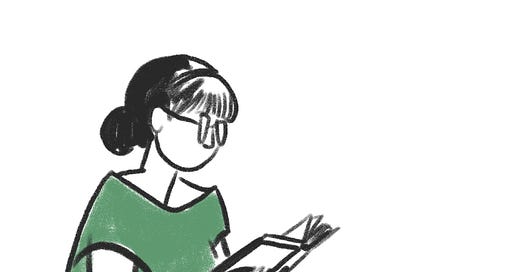



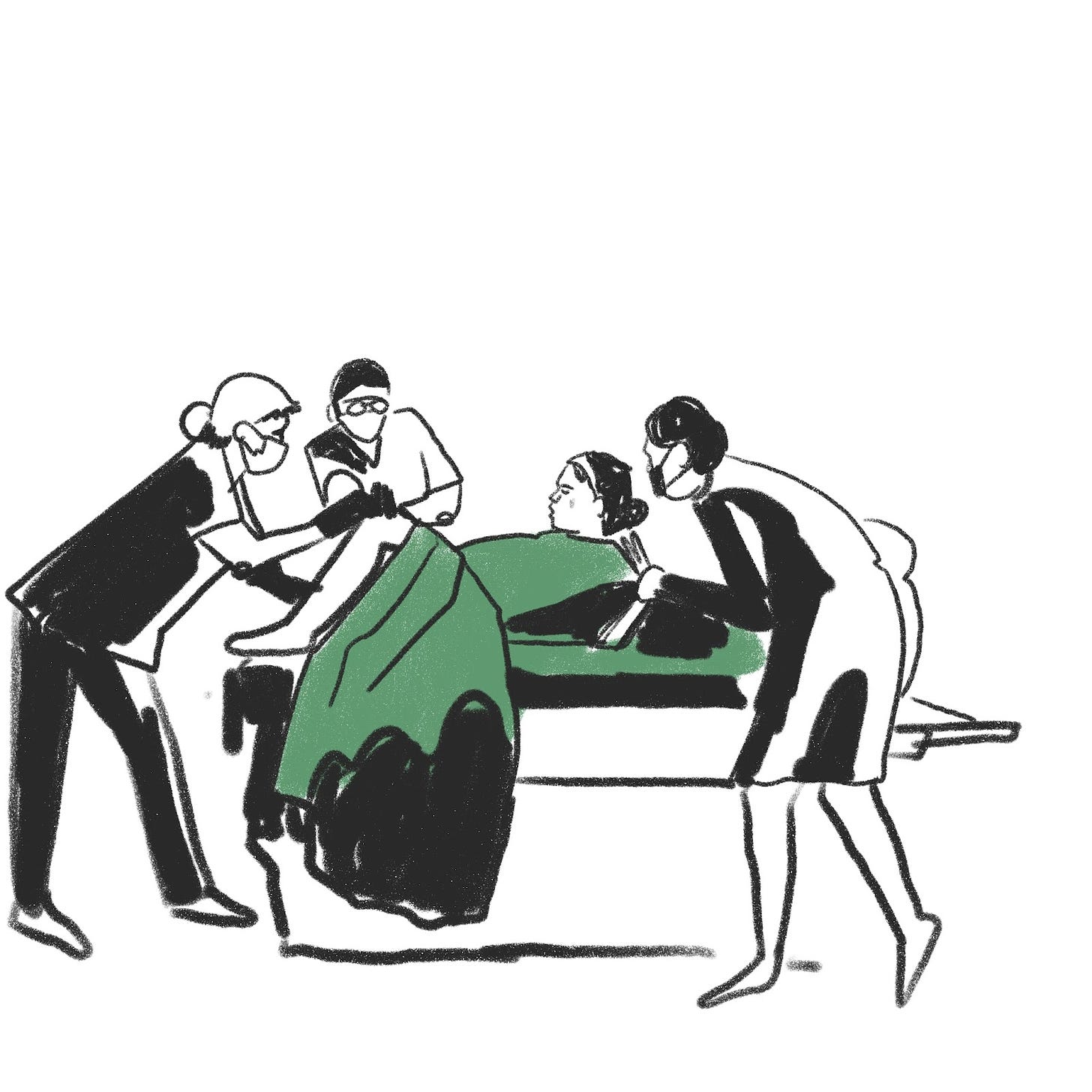
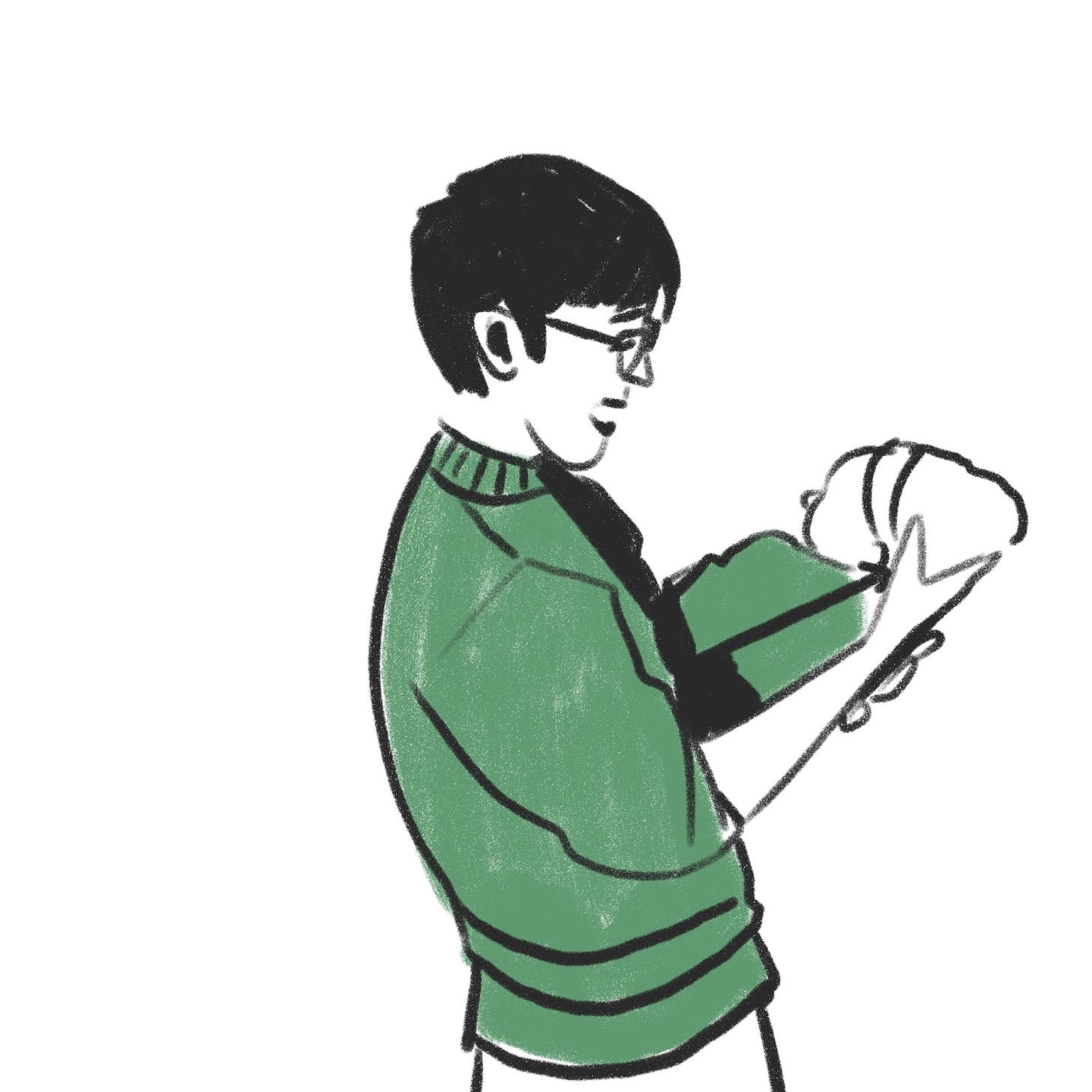
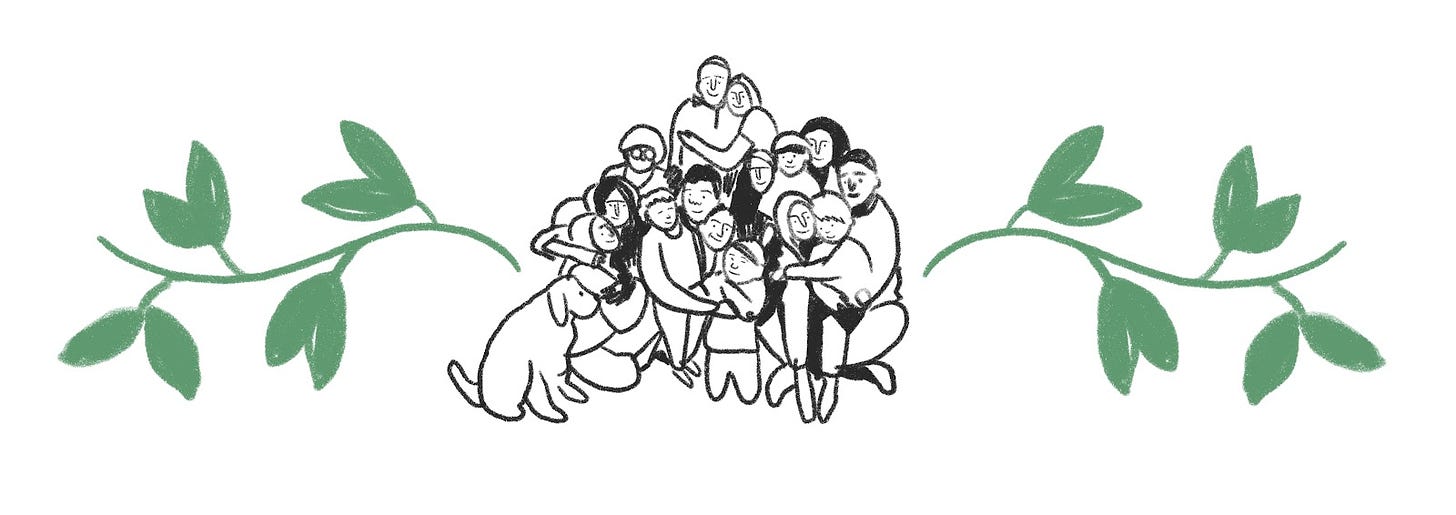
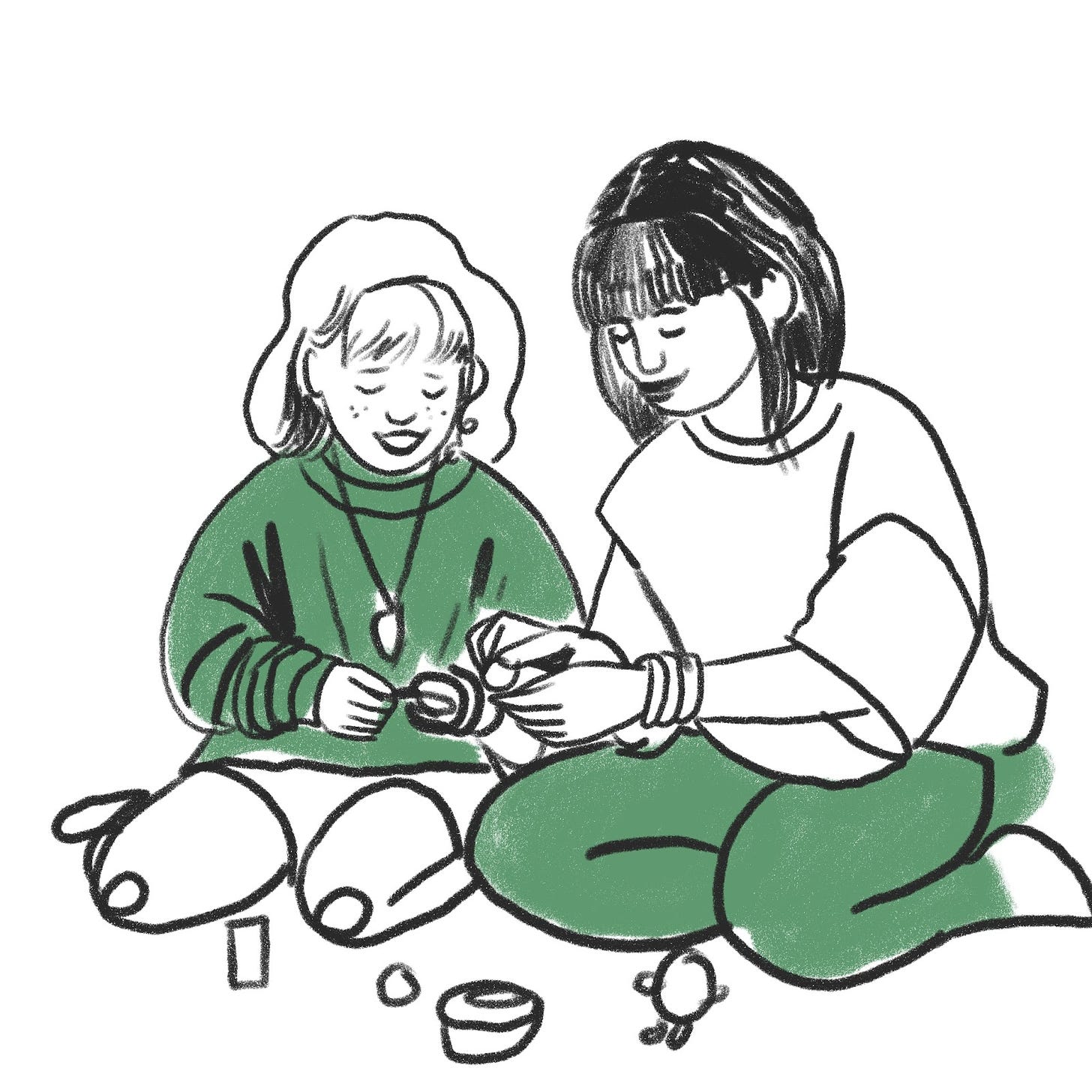
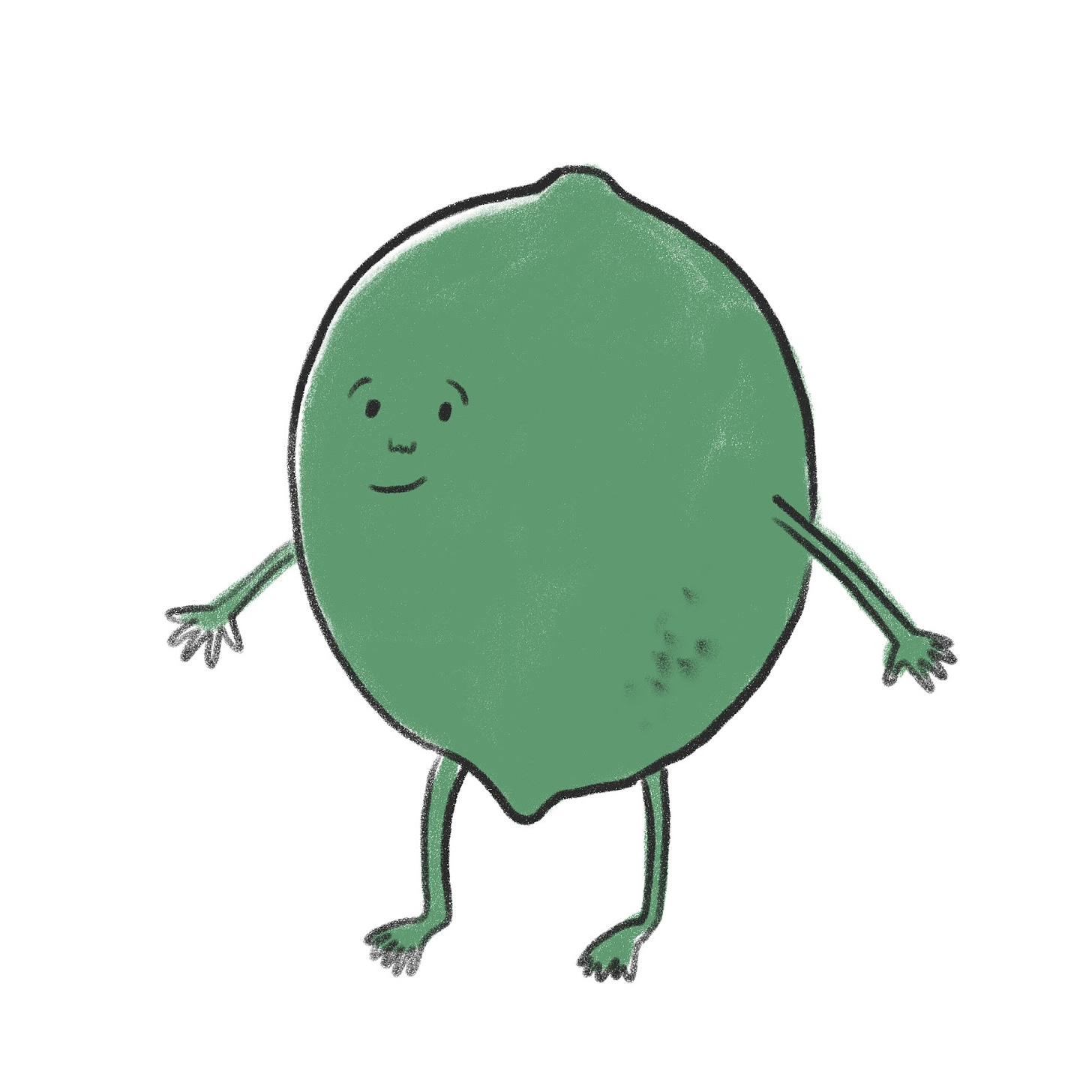
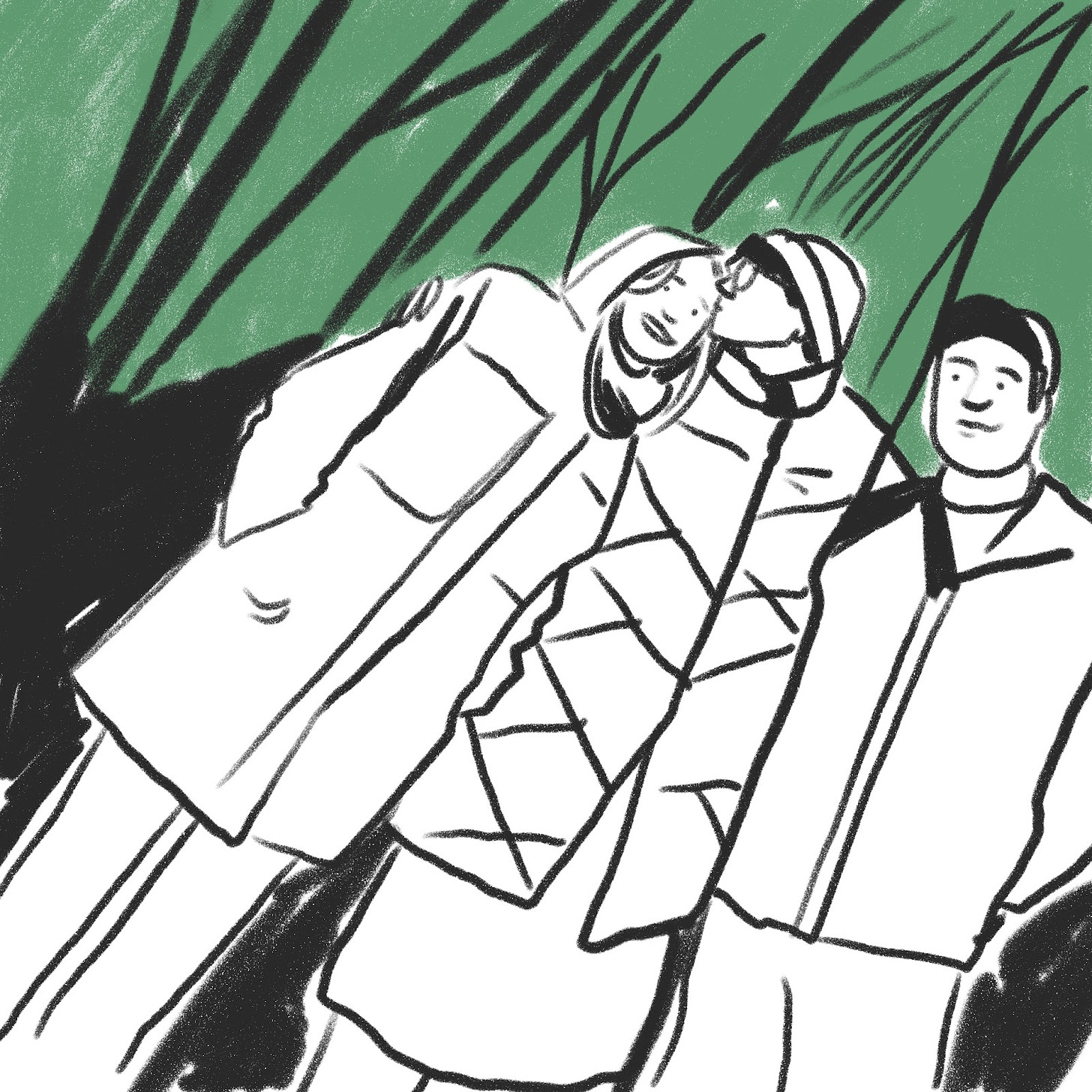
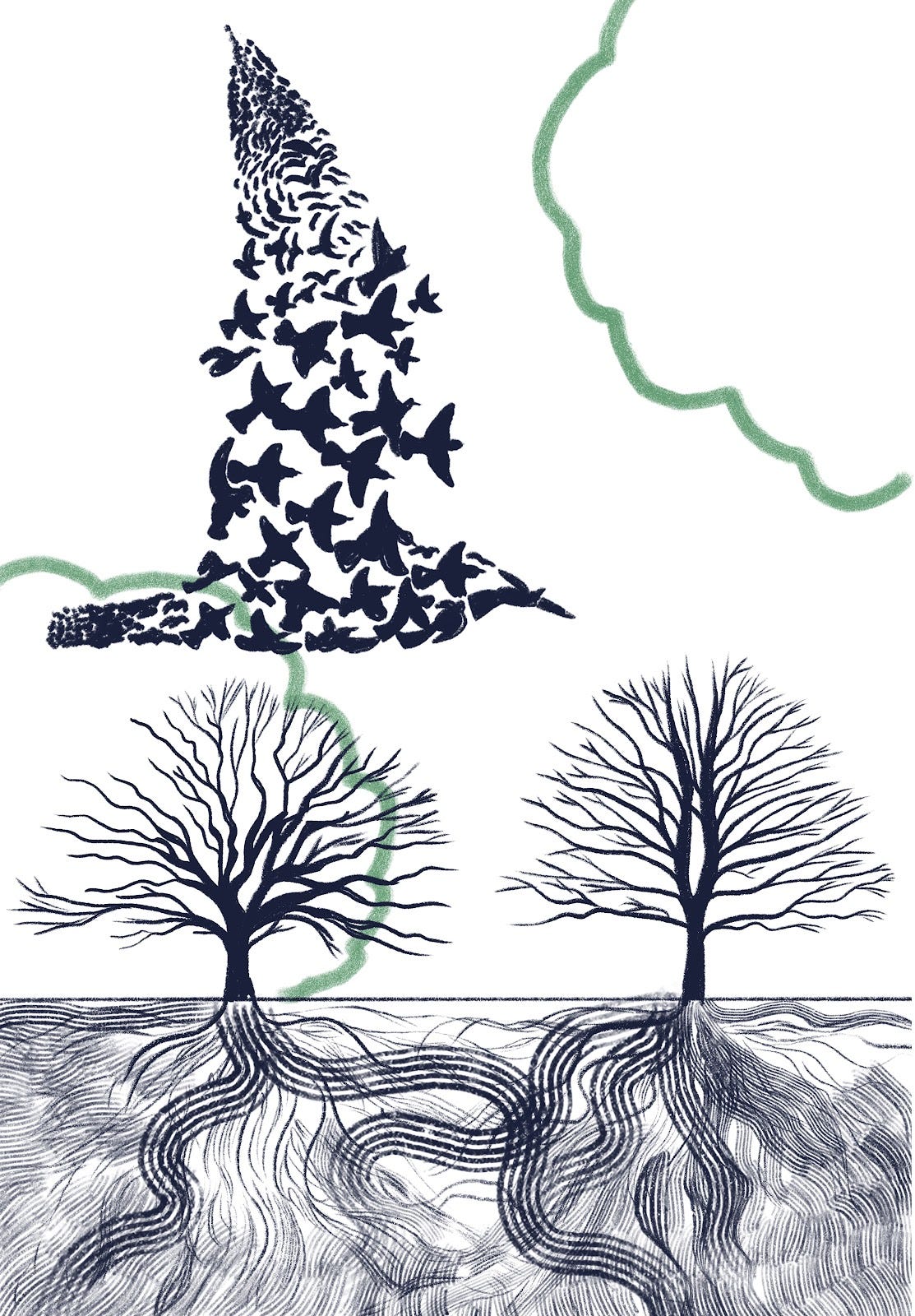
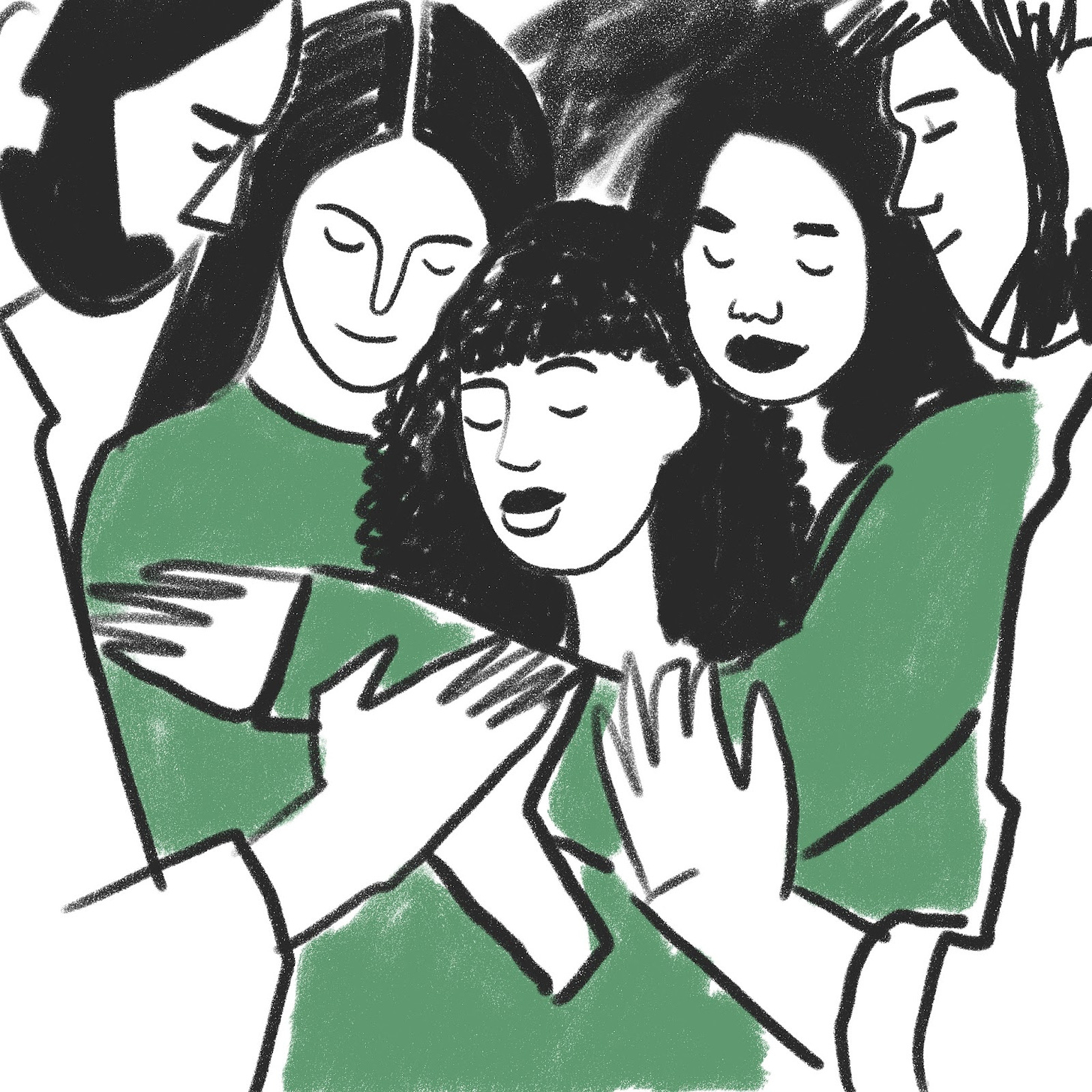
What a beautiful piece to start my day with. Thank you Sophie! Thank you Esmé, as always! xx
Wow I love this so much. I've been mulling over this same question of what a family means, and to me it has never come down to something as simple as blood. Thank you for sharing this.